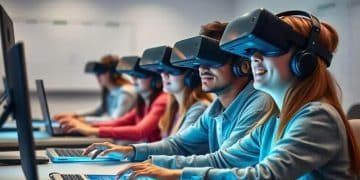AI tutoring programs trends that are changing education

AI tutoring programs trends are reshaping education through increased personalization, integration of virtual reality, and a focus on both academic and soft skills, enhancing student engagement and learning outcomes.
AI tutoring programs trends are transforming the educational landscape, making learning more accessible and efficient. Have you noticed how these technologies enhance student engagement? Let’s explore how this evolution influences learning today.
Current innovations in AI tutoring programs
Current innovations in AI tutoring programs are changing how students learn. These advancements make learning more tailored and engaging. With technology evolving, educators are finding new ways to connect with students through personalized experiences.
Enhanced Personalization
One of the most exciting innovations is enhanced personalization. AI systems analyze a student’s learning style and adapt content to fit their needs.
- AI tutoring identifies strengths and weaknesses.
- It suggests resources tailored to individual progress.
- Students receive instant feedback on assignments.
This tailored approach improves student engagement. As they interact with content suited to them, they feel more motivated and involved.
Interactivity and Engagement
Another innovation is the use of interactive tools within AI tutoring. These tools incorporate gamification elements that make learning fun.
- Games promote problem-solving skills.
- Instant rewards encourage continuous effort.
- Simulations provide real-world applications of knowledge.
By integrating these features, learning transitions from a task to an experience. This increase in engagement helps students retain information better.
Benefits of personalized AI tutoring

Personalized AI tutoring brings numerous benefits that enhance the learning experience for students. This approach tailors education to meet individual needs, making learning more effective and enjoyable.
Academic Improvement
One major advantage is academic improvement. With personalized tutoring, students receive support in the areas where they struggle the most. They can progress at their own pace.
- Targeted help in difficult subjects.
- Flexible learning schedules suit personal needs.
- Frequent assessments track improvement.
This focused attention leads to higher grades and deeper understanding.
Enhanced Engagement
Personalized AI tutoring also enhances student engagement. The use of tailored content keeps students interested in their studies.
- Interactive lessons that match learning preferences.
- Gamified experiences make learning fun.
- Smart assistants offer immediate help and encouragement.
When students enjoy what they learn, they are more likely to stay motivated and committed to their education.
Building Confidence
Another key benefit is the boost in confidence that personalized tutoring provides. As students master content, their self-esteem grows.
Understanding complex topics and overcoming challenges helps them feel capable. This newfound confidence often leads to a more positive attitude towards learning.
Students develop skills that will benefit them in the long run, both academically and personally.
Challenges faced by AI tutoring technologies
While AI tutoring technologies offer many benefits, they also face significant challenges. Understanding these challenges is crucial for enhancing these tools and ensuring they serve students effectively.
Data Privacy Concerns
One main challenge is data privacy. AI tutoring systems often collect sensitive information about students.
- Protecting personal data is essential.
- Many parents worry about how data is used.
- Compliance with regulations like GDPR is vital.
Developers must focus on creating secure platforms to build trust among users.
Technical Limitations
Another challenge is technical limitations of current AI systems. Despite advancements, AI can struggle with understanding complex human emotions.
- AI might misinterpret student frustrations.
- Conversations may feel robotic or impersonal.
- Human-like interaction remains a goal.
These limitations can hinder the effectiveness of tutoring, as students may not feel connected.
Adaptive Learning Algorithms
Adaptive learning algorithms are essential for personalized education, but they face ongoing challenges. Developing algorithms that adapt smoothly to a student’s learning style is complex.
If the algorithms fail to adapt adequately, the tutoring experience can become frustrating. Developers must continually test and refine these algorithms to provide an optimal learning environment.
Finding the right balance of challenge and support is key to keeping students engaged and successful in their learning journeys.
Future trends in AI education

The future of AI education holds exciting possibilities that could redefine how we approach learning. As technology continues to advance, several trends are emerging that promise to enhance the educational landscape.
Increased Personalization
One major trend is increased personalization. Future AI tutoring solutions will likely offer even more tailored learning experiences. They will adapt to a student’s unique needs more effectively than today.
- AI will analyze learning habits over time.
- Custom content will cater to individual strengths and weaknesses.
- Learning paths will become fluid and flexible.
This level of personalization could lead to better engagement and improved learning outcomes.
Integration of Virtual Reality
Another trend is the integration of virtual reality (VR) in education. VR can create immersive learning environments that enhance understanding.
- Students can experience complex concepts in a visual way.
- Real-world scenarios can be simulated for hands-on practice.
- Collaboration in virtual spaces can connect students globally.
This interaction can make learning more impactful and memorable.
Emphasis on Soft Skills
The future also emphasizes the importance of soft skills alongside academic knowledge. As AI tools evolve, they will incorporate training for skills such as critical thinking and communication.
Students will engage in projects that develop these essential skills, preparing them for the workforce. Educators will be able to track soft skill development through AI analytics, ensuring a well-rounded educational experience.
These advancements will make education more relevant to real-world applications and workplace demands.
FAQ – Frequently Asked Questions about AI Education
What are the main benefits of personalized AI tutoring?
Personalized AI tutoring offers tailored learning experiences, helps track progress, and enhances engagement, boosting overall student performance.
How is virtual reality used in AI education?
Virtual reality provides immersive learning environments where students can experience concepts in a visual and interactive manner.
What are the challenges facing AI tutoring technologies?
Challenges include data privacy concerns, technical limitations in understanding emotions, and the complexity of adaptive learning algorithms.
What future trends can we expect in AI education?
Future trends include increased personalization, integration of virtual reality, emphasis on soft skills, and enhanced engagement through innovative methods.






